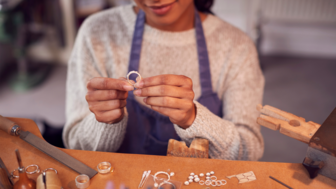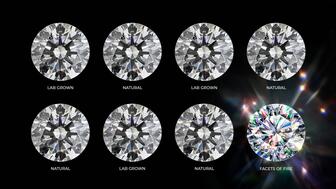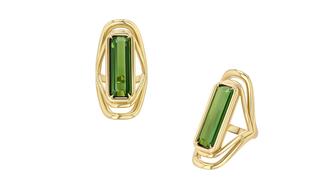The pieces in “Animali Tarallo” portray animals from stingrays to elephants through portraits and interpretations of their patterns.
The Mistakes Made in Marketing to Women
The creator of JWT’s “Female Tribes” study talks with our editor-in-chief about older women being left out of advertising and why “shrink-it-and-pink-it” doesn’t work.

For me, the most interesting part of De Beers’s 2017 Diamond Insight Report came on page 13.
And it came from a woman who has been heading a now five-year-long research project into, as she put it, “contemporary femininity.”
Rachel Pashley is the London-based group planning head at J. Walter Thompson (JWT), the same agency that used to head De Beers’s U.S. marketing and advertising efforts in the United States, back in the big-budget days of “A Diamond is Forever.”
She pioneered a rolling study at the firm called “Female Tribes,” which has connected with thousands worldwide to gain a better understanding of women of all ages today.
De Beers interviewed her for its insight report, noting that “Many of the findings [of Female Tribes] that relate to diamond jewelry are used in this report.” The insight report is informing the Q4 marketing campaign and collection for De Beers’s diamond brand Forevermark, which will launch next week and will be focused on women, particularly those who buy jewelry for themselves.
Earlier this week, Pashley took the time to talk with National Jeweler over the phone about why she launched the Tribes project, what she’s learned, and what today’s diamond advertising is doing wrong.
National Jeweler: When, why and how did you start the Female Tribes project?
Rachel Pashley: I started it probably around five years ago. As part of my job, I travel around the world to various clients, and one of the things I noticed was I’d walk into boardrooms in, say, Russia or China and Brazil and one of the sort of startling things was … it was nearly always an entirely female board room.
It was just very impressive to see that something was changing and it was something that I wanted to record. Because, for the most part, my impression was that as marketers, we weren’t really catching up with what was happening with the real world.
Every time I saw a creative brief, nearly always we were referring to women in terms of their parental responsibilities; I saw “busy working mum” written on creative briefs a lot.
And, yet, when I saw a creative brief that was for a male audience, he got to have hopes, dreams, aspiration, ambitions, and that was incredibly frustrating.
So I embarked on an in-depth research project to really look at how powerful women are in
After a couple of years, I was lucky enough to secure funding to conduct our own proprietary research through the agency, which is what we call the Women’s Index. It now covers 19 countries and over 8,000 women ages 17 to 70. What we can tell is the hopes, fears, ambitions, dreams, aspirations, and views on love and sexuality and technology of all these women from around the world.
It gives a very rich picture of contemporary femininity.
NJ: In the sense you use it in the study, what does the word “tribe” mean exactly?
RP: The tribes are a way of characterizing what I call female capital, which is the value women bring to the world.
We’ve identified cohorts of women in over 22 different tribes and counting.
We define the tribe based on attitudinal data. Whereas traditional consumer segmentation looks at your age and demographics, we think that’s quite a blunt tool to describe women.
Through the research we’ve been doing, [we’ve discovered that] age is no predictor of life stage. You can’t look at a woman and think she’ll be single in her 20s, married in her 30s, having children, retired in her 50s and nicely settled down at home bouncing grandchildren on her knee.
The fact is a woman in her 50s now is as likely to be single and dating as a women in her 20s. We’re seeing women in their teens start businesses. We’re seeing women in their 70s and 80s take up athletics.
You look at the way life has changed for women--the power and status that they have and the things they are doing--and it’s nothing short of a quiet revolution. And I really wanted to tell that story.
NJ: I know you’ve studied women all over the world but, for the sake of our readership, can you share some Tribe data about women in the United States?
RP: The U.S. for me was an interesting paradox.
One on hand, we observed many more Alpha Female tribes. What we see is that women in the U.S. are much more openly alpha and more openly confident in their own success than, say, European Alphas.
We also observed many more of what we call the Traditionalist tribes. We have a tribe called the Nurturers, or the spouse-focused tribe, and those are what you could classify as traditional homemakers. Their sole focus is the home and bringing up children.
So it’s this interesting mix: One on hand, you had a much higher index of Alpha females but, equally, you had a much higher index of what I call the traditional tribes in America.
I think the other thing that stood out in America was there were significantly more of the Not-Mum tribe--women who didn’t see themselves as childless but happily child-free. What we observed with the not-mum tribe is because they are not having to consult with others in decision-making, they make much faster, self-determined decisions.
But, equally, there was more frustration with say, for example, financial service providers. [For example, they feel that] if I’m walking into a bank and I’m not accompanied by a husband and we’re not talking about settling down and having children, they’re just not interested in my business.
NJ: Interesting. What are the biggest mistakes you see companies making when marketing and advertising products that are mainly bought and/or consumed by women?
RP: I think one of the big mistakse is this sense of, “Well, to market to women I need to feminize my product in some way”--the kind of shrink-it-and-pink-it philosophy.
I’m often fond of quoting the athletic/running shoe example … Women are getting into distance running more in the U.S., they are finishing races--more of them than men in the U.S. And it’s only now in 2017 that we are designing a trainer specifically for women’s feet. Before, they’d just take a men’s trainer, shrink it and put it in pastel colors.
NJ: Because, clearly, we all want to wear everything pink.
RP: (Laughs.) I find it quite bizarre.
There’s a computer company that shall remain nameless that launched a laptop for women and they launched it with an in-built calorie counter. That’s just a face-palm moment of, what were you thinking? That’s a fundamental misunderstanding of women.
NJ: Can you provide any commentary or observations on jewelry advertising specifically?
RP: One of the things that I observe--and I think, to be fair, some of the people I’ve spoken to in the industry would observe as well--is that the model of advertising is still quite, in some cases, old-school.
I think particularly in diamond jewelry, there’s a lot of emphasis on love gifting; you’re almost creating a narrative of, “Be a good girl, get a diamond!” And you’re not giving women enough permission to buy for themselves, to reward themselves.
I think that’s reflected in the communication but also, in some cases, in the in-store experience.
Sometimes it can be quite intimidating going in as a women on your own to buy jewelry for yourself. You almost feel like as soon as you’re through the doors, again [like in the bank example above], there’s the expectation of where’s the fiancé, where’s the husband? And of course the big-ticket item is going to be bought by the wealthy male partner and gifted to the woman, as opposed to her buying it for herself.
My other observations would be you still see too many women who are in photoshoots wearing jewelry in a very passive pose. So, beautiful woman, draped over furniture, wearing the gorgeous bracelet--she looks incredibly passive, like she’s the object, not the subject, of her own life story, which is a frustration.
Equally, I also see this--that sometimes the models feel so young. We’re ignoring wealthy [baby] boomer women. Certainly in the U.K., boomers control over 70 percent of personal wealth, make over 40 percent of consumer purchases … but they’re being largely ignored, sort of airbrushed out of the picture.
NJ: Can you give me an example of a company or brand you think does a great job of speaking women today?
RP: I think what Under Armour is doing is really interesting.
Something we saw in our research was that women would rather be defined as “strong” than “sweet.”
I love the work that Under Armour does in celebrating women’s strength, and unapologetic strength. What we see is that women are embracing their physicality and physical prowess.
And we also observed in our research that high-achieving women often have a secret sporting side that makes them the women they are. So they might use sport and athleticism in a slightly different way … not necessarily to win the gold medal but to feel strong and powerful, fuel that inner strength.
NJ: Anyone else?
RP: I like some of the work that Calvin Klein has been doing in featuring [73-year-old model and actress] Lauren Hutton--so featuring older, amazingly beautiful women who are more than 25, and I think that’s beautiful, and actually not airbrushing wrinkles but celebrating mature, beautiful, iconic women who have substance to them as well.
The Latest

Parent company Saks Global said the iconic location will be open through the holiday season as it decides what to do with the space.

Ronald Winston, son of Harry Winston, donated the diamonds to the Smithsonian National Museum of Natural History in Washington, D.C.

Bench jewelers spend years honing their skills, Jewelers of America’s Certification validates their talents.

The virtual event will take place April 7 at 3 p.m.


The educational event will take place in Charlotte, North Carolina, this May.

The independent jeweler first opened its doors in 1888.

Natural diamonds mean more than lab-grown, but when every cut is ideal, they all look the same. Customers want more—Facets of Fire delivers.

The layoffs come amid the TV shopping channel’s efforts to restructure and focus on live shopping through social media.

The debut event will take place in Miami’s Coconut Grove neighborhood this fall.

The roundtable will take place May 17 ahead of the trade show’s welcome dinner.

The “Peanuts x Monica Rich Kosann” collection features the comic strip’s classic vocabulary across 10 bracelet designs.

Three industry experts dive into the complexities of the material often marketed as an “ethical” alternative for metal in jewelry.

Diamonds are not only one of the most prominent gemstones, but the birthstone for those born in April.

The Utah-based company known for making wedding bands has acquired Doubloon Golf.

The longtime luxury executive led one of LVMH’s watch brands, TAG Heuer, for 12 years before taking over Bulgari in 2013.

Authorities said the robbers fled with jewelry and 70 Rolex watches, later taking pictures of themselves posing with big stacks of cash.

Lotus Gemology founder Richard W. Hughes has translated Heinrich Fischer’s 1880 book “Nephrit und Jadeit” from its original German.

The ring's design features contrasting lines influenced by work from architecture-inspired photographer Nikola Olic.

The Conference Board’s index fell as consumers continued to worry about the impact of tariffs, the labor market, and the price of eggs.

However, two medieval jewels surpassed estimates at Noonans Mayfair’s recent jewelry auction in London.

The Oscar-nominated actor debuted in the campaign for the new “Top Time B31” collection, which introduced Breitling’s Caliber B31.

The Congress is scheduled to take place May 19-22 in Brasilia, Brazil.

The family-owned retailer is the new owner of Morrison Smith Jewelers in Charlotte, North Carolina.

The “150 Art Deco” collection features a Miss America timepiece and a pocket watch from the brand’s Archive Series.

Alex Wellen, formerly CEO and president of MotorTrend Group, has taken on the role.

The Impact Initiative is part of the nonprofit association’s new three-year strategic plan.



























